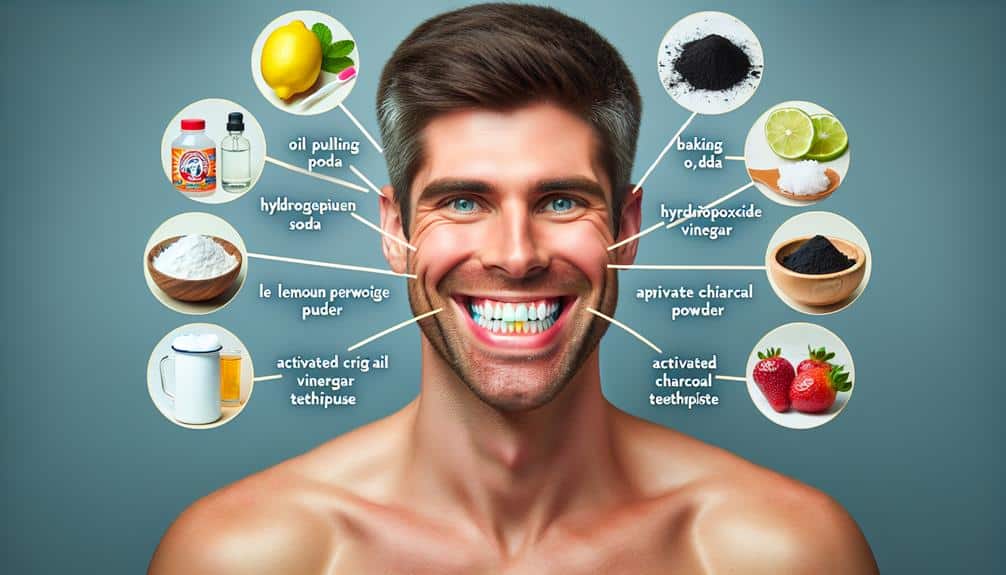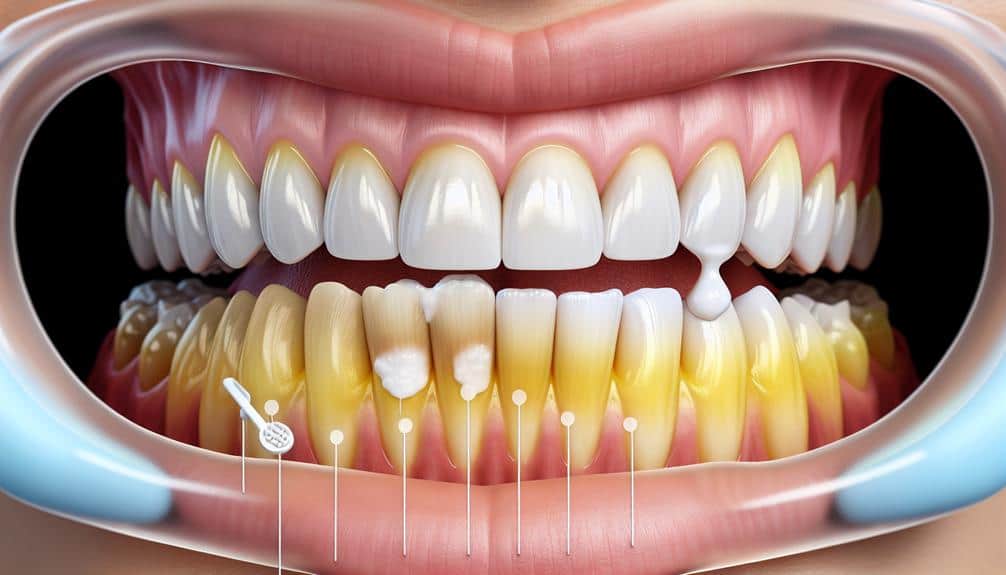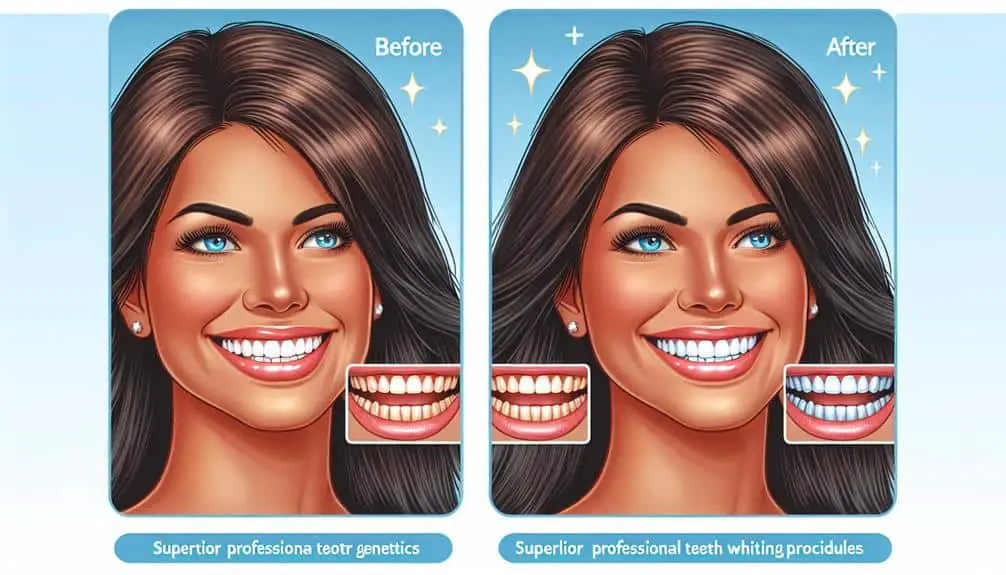To whiten genetically discolored teeth, start by consulting a dentist for personalized advice. Use peroxide-based whitening products correctly and gradually increase application frequency. Opt for gentle toothpaste and maintain good oral hygiene. Manage diet for whitening results by avoiding acidic foods and increasing water intake. Regular dental check-ups can detect issues early for peak oral health. By following these top 10 whitening tips, you can enhance your smile's brightness effectively. Further recommendations can offer tailored strategies based on genetic factors for even better results.
Key Points
- Consult a dentist for personalized whitening plans based on genetic factors.
- Use peroxide-based products cautiously following guidelines for safe and effective results.
- Maintain a regular whitening schedule to maximize peroxide effectiveness and prevent sensitivity.
- Practice good oral hygiene, opt for enamel-safe products, and monitor progress with a dental professional.
- Incorporate enamel-safe diet choices and regular dental check-ups for optimal oral health and whitening outcomes.
Understanding Genetic Tooth Discoloration
Do you know why some individuals have genetic tooth discoloration despite proper oral hygiene practices? Genetic factors play a significant role in determining the color of your teeth. Inherited discoloration can be a result of variations in your genes that affect the development and structure of your enamel, the outer layer of your teeth. These genetic factors can make your teeth more prone to staining or cause them to have a natural color that differs from the typical white shade.
Prevention is key when it comes to managing genetic tooth discoloration. While you can't change your genetic makeup, there are steps you can take to minimize the impact of inherited discoloration. Maintaining good oral hygiene practices, such as regular brushing and flossing, can help prevent further staining and keep your teeth healthy. Additionally, avoiding foods and drinks that are known to cause discoloration, like coffee and red wine, can also help in managing the issue.
When it comes to solutions for genetic tooth discoloration, professional whitening treatments or cosmetic procedures performed by a dentist can help improve the appearance of your teeth. Consulting with a dental professional will allow you to explore the most suitable options for addressing your specific genetic discoloration concerns.
Importance of Professional Consultation
When considering genetic tooth discoloration, seeking professional consultation is essential.
Expert guidance can provide you with tailored treatment recommendations specifically designed for your unique case.
Professional consultation guarantees precision in treatment, helping you achieve the best results possible.
Expert Guidance Benefits
Seeking professional consultation for genetic discoloration can provide valuable expertise and tailored guidance for effective whitening treatments. Expert recommendations based on genetic factors can greatly impact treatment success. Professionals can assess your specific situation, taking into account genetic predispositions that may influence the outcome of whitening procedures.
Through expert guidance, you can understand the underlying causes of discoloration and receive personalized recommendations for the most suitable whitening treatments. Additionally, professional consultation guarantees patient compliance, as you'll be guided on the proper use of whitening products and techniques. This level of expertise can lead to better outcomes and enhanced satisfaction with the results of your whitening journey.
Trusting in expert advice is a vital step towards achieving your desired brighter smile.
Tailored Treatment Recommendations
By consulting with a professional, you can receive tailored treatment recommendations that are specifically designed to address genetic discoloration effectively. When seeking treatment for genetic predisposition to discoloration, it's important to prioritize individualized care and genetic factors. Here are four key reasons why professional consultation is essential:
- Personalized Approach: Professionals can assess your unique genetic makeup and create a customized treatment plan.
- Specialized Knowledge: Experts are equipped with in-depth knowledge of genetic factors influencing discoloration.
- Effective Treatment Options: Professionals can recommend the most suitable treatment options based on your genetic predisposition.
- Monitoring Progress: Regular consultations allow for monitoring progress and adjusting treatment as needed to achieve the best results.
Precision in Treatment
For accurate treatment tailored to your genetic discoloration, consulting with a professional is vital for effective outcomes. Treatment precision is essential for achieving long-term results in whitening procedures.
Professional expertise allows for the use of precision techniques that target specific types of genetic discoloration. By seeking professional consultation, you can benefit from personalized treatment plans that address your unique needs.
Professionals can recommend the most suitable whitening methods based on the severity and specific characteristics of your genetic discoloration. Their guidance guarantees that the treatment isn't only effective but also safe for your dental health.
Trusting in professional expertise ensures that you receive the most precise and successful whitening treatment for your genetic discoloration.
Customized Whitening Treatment Plans
When developing a whitening treatment plan for genetic discoloration, it's essential to customize the approach based on individual needs and oral health conditions.
Here are four key considerations for creating a personalized whitening treatment plan:
- Assessment of Discoloration: Conduct a thorough examination to understand the extent and nature of the genetic discoloration. This step is pivotal in determining the most suitable whitening approach.
- Professional Consultation: Seek guidance from a dental professional who can assess your oral health status and recommend a customized whitening plan that aligns with your specific needs and goals.
- Customized Treatment Plan: Based on the assessment and consultation, develop a tailored whitening treatment plan that considers the severity of discoloration, sensitivity issues, and desired outcomes.
- Regular Monitoring: Maintain communication with your dentist throughout the whitening process to track progress, address any concerns promptly, and guarantee the effectiveness of the treatment over time.
Use of Peroxide-Based Whitening Products
When contemplating the use of peroxide-based whitening products for genetic discoloration, it's crucial to comprehend their efficacy in breaking down stains.
You should prioritize safety by adhering to recommended guidelines and seeking advice from a dental professional.
Additionally, be aware of the frequency of application to prevent potential risks and achieve best results.
Peroxide Effectiveness Explained
Considering the effectiveness of peroxide-based whitening products, it's essential to understand their impact on genetic discoloration. Peroxide concentrations play an important role in achieving desired results, but it's important to be aware of potential risks associated with higher concentrations.
To effectively use peroxide-based whitening products, follow these tips for success:
- Start with a lower concentration to test sensitivity levels.
- Gradually increase the concentration based on your tolerance.
- Follow the recommended application guidelines to avoid damaging your enamel.
- Use a desensitizing toothpaste if you experience any discomfort during or after treatment.
Safety Considerations When Using
To guarantee safe and effective use of peroxide-based whitening products, understanding and following recommended guidelines is essential. Safety precautions should always be followed when using these products. Prior to starting any whitening treatment, it's important to consult with a dental professional to make sure that the product is appropriate for your teeth and gums.
When selecting a whitening product, opt for reputable brands with ADA approval to guarantee quality and safety. It's important to carefully read and follow the instructions provided with the product to minimize the risk of adverse effects. By taking these safety measures and choosing the right product, you can whiten your teeth effectively while maintaining oral health.
Frequency of Product Application
For best results with peroxide-based whitening products, adhere to the recommended frequency of application as specified in the product instructions. Consistency in applying these products is essential for achieving peak results.
Here are some essential tips to maximize product effectiveness and maintain a proper application frequency:
- Follow the instructions provided by the manufacturer diligently.
- Avoid overuse of whitening products to prevent tooth sensitivity.
- Maintain a regular schedule for application to guarantee continuous progress.
- Consult with a dental professional to tailor the whitening regimen to your specific needs and to monitor any potential side effects.
Avoiding Abrasive Toothpaste
Using abrasive toothpaste can exacerbate genetic discoloration of teeth due to its harsh impact on the enamel. To avoid worsening discoloration, opt for toothpaste that's specifically formulated for gentle whitening. Abrasive toothpaste can wear down the enamel over time, making teeth more susceptible to stains and discoloration, especially in individuals with genetic predispositions.
When selecting a toothpaste, look for terms like 'gentle,' 'enamel-safe,' or 'non-abrasive' on the packaging. These formulations are designed to provide a thorough clean without compromising the integrity of your enamel. Additionally, be mindful of your brushing technique. Brush gently in circular motions to remove surface stains without damaging the enamel.
Maintaining Good Oral Hygiene
To maintain good oral hygiene, make sure you're using proper brushing techniques to effectively remove plaque and prevent discoloration.
Regular dental check-ups are crucial for early detection of any issues and for professional cleaning that can help maintain the whiteness of your teeth.
Brushing Techniques for Efficacy
Master excellent oral hygiene by perfecting efficient brushing techniques that focus on all surfaces of your teeth. Proper technique and consistent brushing habits are essential for maintaining oral health. Follow these tips to guarantee your brushing is effective:
- Angle your brush: Hold your toothbrush at a 45-degree angle towards the gum line to clean along the gum margin.
- Use gentle pressure: Avoid aggressive scrubbing to prevent enamel damage and gum recession.
- Brush all surfaces: Clean the outer, inner, and chewing surfaces of your teeth thoroughly.
- Time your brushing: Brush for at least two minutes, spending equal time in each quadrant of your mouth to ensure a thorough clean.
Importance of Regular Check-Ups
Regular dental check-ups play an important role in maintaining good oral hygiene and preventing potential dental issues. These preventive measures are vital for your oral health. Routine check-ups allow your dentist to detect any early signs of cavities, gum disease, or other dental problems before they escalate into more serious issues.
Professional cleanings during these visits help remove plaque and tartar buildup that regular brushing and flossing might miss. Additionally, your dentist can provide personalized advice on oral care tailored to your specific needs.
Managing Diet for Whitening Results
Improving your dietary choices can greatly impact the effectiveness of whitening treatments for genetic discoloration. What you eat plays a significant role in the overall health of your teeth and can influence the success of whitening procedures. Consider making the following dietary changes to enhance your whitening results:
- Limit Acidic Foods: Acidic foods and drinks can erode the enamel, making teeth appear more yellow. Cut back on citrus fruits, vinegar-based dressings, and soda to preserve the whiteness of your teeth.
- Increase Water Intake: Drinking water helps wash away food particles and reduce the buildup of stains on your teeth. Aim to drink plenty of water throughout the day to maintain a bright smile.
- Include Crunchy Fruits and Vegetables: Crunchy fruits and vegetables like apples, carrots, and celery act as natural teeth cleaners, helping to remove surface stains and promote whiter teeth.
- Choose Calcium-Rich Foods: Calcium is essential for strong teeth. Incorporate dairy products, leafy greens, and almonds into your diet to support tooth enamel and overall oral health.
Regular Dental Check-ups
Scheduling regular dental check-ups is important for maintaining peak oral health and detecting any potential issues early on. Brushing techniques and oral hygiene maintenance are vital aspects that your dentist can assess during these visits. Your dentist will evaluate your brushing techniques to make sure you're effectively removing plaque and preventing stains. They can provide personalized recommendations on improving your oral hygiene routine, which is essential for keeping your teeth healthy and bright.
During your dental check-ups, your dentist will also conduct thorough examinations to identify any signs of discoloration or other dental concerns. Early detection of issues such as enamel erosion or gum disease can prevent further discoloration and maintain the overall health of your teeth. By staying proactive with your regular dental visits, you can address any potential problems promptly and work towards a brighter, healthier smile. Remember, prevention is key in maintaining ideal oral health and achieving long-lasting whitening results.
Combining Whitening With Preventive Care
To enhance the effectiveness of whitening treatments, consider integrating them with preventive care measures recommended by your dentist. Essential care techniques play a vital role in maintaining your newly brightened smile and preventing future discoloration. Here are some key strategies to combine with your whitening routine:
- Brushing and Flossing: Maintain good oral hygiene practices by brushing at least twice a day and flossing daily to prevent plaque buildup that can lead to staining.
- Regular Dental Check-ups: Schedule routine dental visits to monitor your oral health, address any issues promptly, and receive professional cleanings to keep your teeth healthy and bright.
- Avoid Staining Foods and Drinks: Limit consumption of coffee, tea, red wine, and other foods known to stain teeth to prolong the effects of whitening treatments.
- Use Whitening Toothpaste: Incorporate whitening toothpaste into your daily routine to help maintain your smile's brightness and combat surface stains.
Patience and Consistency in Whitening
Maintaining patience and consistency in your whitening routine is vital to achieving lasting results and a brighter smile. When it comes to whitening your teeth, it's important to understand that real change takes time. Consistency in your whitening practices, whether through professional treatments or at-home methods, is pivotal for effective results.
In addition to regular whitening techniques, your lifestyle habits play a significant role in the outcome. Avoiding foods and beverages that stain your teeth, such as coffee, tea, and red wine, can help maintain your whitening results. Brushing your teeth at least twice a day and flossing daily also contribute to a healthier, brighter smile.
It's crucial to follow the instructions provided with your chosen whitening products diligently. Overuse or improper application can lead to tooth sensitivity and other complications. By staying patient, consistent, and mindful of your lifestyle habits, you can maximize the effectiveness of your whitening efforts and enjoy a radiant smile.
Frequently Asked Questions
Can Genetic Tooth Discoloration Be Completely Reversed With Whitening Treatments?
Feeling frustrated by genetic tooth discoloration? Understand that while whitening treatments can help, complete reversal may not be guaranteed due to the underlying genetic predisposition. Inherited stains can be lightened, but effectiveness varies.
Are There Any Specific Risks or Side Effects Associated With Using Peroxide-Based Whitening Products for Genetic Discoloration?
When using peroxide-based whitening products for genetic discoloration, it's important to take into account peroxide safety. Long term effects may include tooth sensitivity and gum irritation. Consult with a dental professional for guidance on managing risks effectively.
How Long Does It Typically Take to See Noticeable Results From a Customized Whitening Treatment Plan for Genetic Discoloration?
Typically, noticeable results from a customized whitening treatment plan for genetic discoloration can be seen within a few weeks to a couple of months. Progress tracking is essential, and realistic expectations should be set.
Are There Any Alternative Methods or Treatments Available for Genetic Tooth Discoloration Besides Whitening?
For genetic tooth discoloration, besides whitening, consider natural remedies like oil pulling or turmeric paste. Professional treatments from cosmetic dentistry offer options such as veneers or bonding. Home remedies and professional treatments can provide effective alternatives.
Can Certain Foods or Drinks Worsen Genetic Tooth Discoloration, and if So, What Should Be Avoided for Optimal Results?
Feeling like your diet's turning into a tooth discoloration villain? Choose dietary restrictions like reducing sugary snacks and acidic drinks. Lifestyle habits matter for best results in fighting genetic tooth discoloration.



